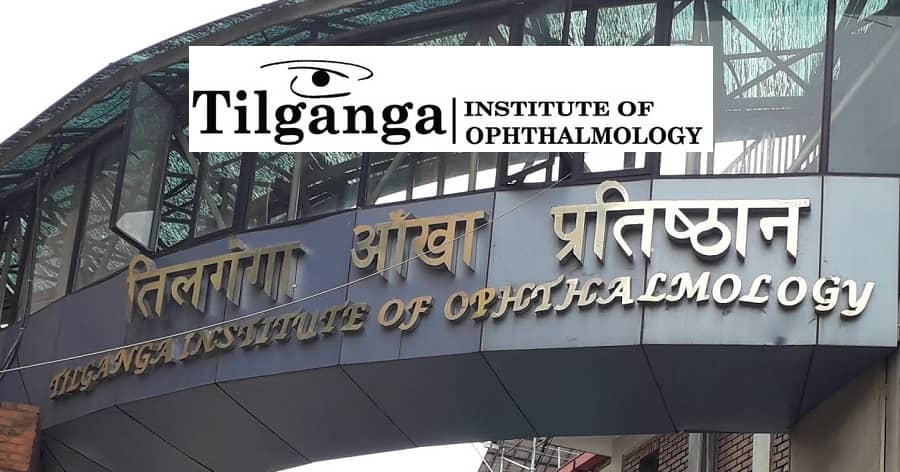Overview
Master of Optometry (M.Optom) at Tilganga Institute of Ophthalmology (TIO)
Program Overview
The Master of Optometry (M.Optom) program at Tilganga Institute of Ophthalmology (TIO), affiliated with Pokhara University, is a pioneering postgraduate course in Nepal, initiated by the Himalaya Eye Institute in 2019. This program is designed to offer advanced education in clinical optometry, preparing students for both academic and professional careers in eye care. Over a span of two years, this intensive program covers four semesters, incorporating a mix of coursework, clinical practice, patient care, teaching assignments, research, and dissertation projects.

|
Programs: Master of Optometry (M Optom) Affiliation: Pokhara University Level: Masters Duration: 2 years Fee (Tentative): NPR 920,230 Entrance Exams: MECEE-PG |
Program Goals
The primary objective of the M.Optom program is to achieve academic excellence in the field of optometry, foster the development of new technologies related to the eye and visual systems, and cultivate leadership qualities among future eye health professionals. The curriculum is structured to equip students with the necessary skills and knowledge to excel in various optometry specialties, including vision therapy, low vision rehabilitation, binocular vision, contact lens practice, neuro-optometry, behavioral optometry, occupational optometry, and therapeutic optometry.
Eligibility Criteria
To be eligible for the Master of Optometry program at TIO, applicants must meet the following requirements:
- A Bachelor of Optometry (B.Optom), Bachelor of Optometry and Vision Science (B.Optom), Doctor of Optometry (O.D.), B.Sc. in Optometry (B.Sc. Optom), or an equivalent degree from a recognized university or institution.
- Registration as an optometrist with the Nepal Health Professional Council (NHPC).
- A minimum score of 50% marks in the entrance examination conducted by the Medical Education Commission (MECEE-PG) to qualify for the merit list.
Program Structure and Curriculum
The M.Optom program at TIO spans two years, divided into four semesters. The curriculum is designed to balance theoretical knowledge with practical application, ensuring students gain comprehensive expertise in the field of optometry. The coursework includes advanced studies in basic and ocular sciences, clinical practice, research methodologies, and specialized optometry fields.
Exam Format
The entrance exam for the M.Optom program follows a single best response type format with multiple-choice questions (MCQs). The exam consists of 200 questions, with a distribution of marks across various subjects related to optometry. The questions are designed to test the candidate’s understanding, recall, and application of knowledge.
Exam Duration: 3 hours
Total Marks: 200
Subject-wise Weightage:
- Basic Science and Organ Systems: 8 marks
- Ocular Anatomy and Physiology: 16 marks
- Physical and Geometrical Optics: 10 marks
- Visual Science: 16 marks
- Ocular Disease: 16 marks
- Diagnostic and Investigative Optometry: 20 marks
- Ophthalmic and Dispensing Optics: 20 marks
- Pediatric Optometry and Binocular Vision: 20 marks
- Contact Lens and Ocular Prosthesis: 20 marks
- Low Vision and Visual Rehabilitation: 20 marks
- Community Optometry: 10 marks
- Geriatric Optometry and Vision Care: 10 marks
- Research Methodology and Biostatistics: 8 marks
- Ethics and Practice Management in Optometry: 6 marks
Career Prospects
Graduates of the M.Optom program are expected to play a vital role in the advancement of eye care in Nepal and beyond. The comprehensive training provided during the program will enable graduates to take on roles as specialist optometrists in various domains, including clinical practice, academic roles, and leadership positions in eye health organizations. They will be well-equipped to contribute to the development of eye health services and vision rehabilitation programs, addressing the growing needs of the community.
Conclusion
The Master of Optometry (M.Optom) program at Tilganga Institute of Ophthalmology is a significant step forward in optometry education in Nepal. With a curriculum that blends academic rigor with practical experience, the program is designed to produce highly skilled optometrists capable of making a meaningful impact in the field of eye care. The program not only addresses the current demands of the healthcare sector but also prepares graduates to lead and innovate in the evolving landscape of optometry.












